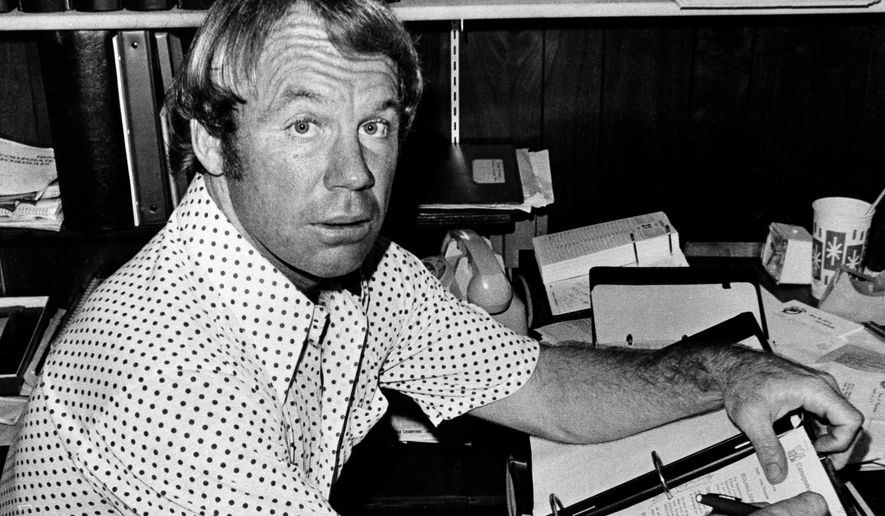Longtime Washington football fans have a flame burning inside their collective memory. A flickering pilot light of a flame that keeps disenfranchised Redskins fans warm when they log on to YouTube to watch John Riggins and his touchdown run in Super Bowl XVII or turn on the radio to hear Doug Williams reliving his four-touchdown, 340-yard performance in Super Bowl XXII.
In the cold desolation that surrounds this once-proud football franchise, huddling around the warmth of those moments can feel like the only way to rekindle hope. To remember what it was to be one with the millions of others who once bled Burgundy and Gold every Sunday.
The shivering souls who have found solace in remembering what was and dreamt of what might be again have Bobby Beathard to thank for that.
Beathard, the architect of Washington’s Super Bowl championship teams, passed away Monday at his home in Franklin, Tennessee, at the age of 86.
He died from complications from Alzheimer’s disease. His gifts were the memories he created for a city — not just any city, but the nation’s capital, the most important city in the world — by perennially elevating the Redskins to championship level. The surfer-boy quarterback from Southern California became one of the most important people in Washington.
Beathard built those championship teams on the back of a historic 1981 NFL draft — one of the greatest in league history. Tackle Mark May was the first selection, followed by guard Russ Grimm at the third position, Dexter Manley with the fifth pick, receiver Charlie Brown at No. 8, followed by Darryl Grant at No. 9 and tight end Clint Didier with the 12th selection.
Joe Theismann wasn’t drafted by Beathard. He came close. Theismann was drafted out of Notre Dame in the fourth round in 1971 by the Miami Dolphins. When negotiations broke down, Theismann signed with the Canadian Football League. He came to Washington in 1974 when George Allen got his rights from Miami in exchange for Washington’s 1976 first-round selection.
The year after Theismann was drafted by the Dolphins, Beathard, a former scout with the Kansas City Chiefs and the Atlanta Falcons, was named Miami director of player personnel. That year the Dolphins would go 17-0 and defeat the Redskins in Super Bowl VII.
Theismann may not have been drafted by Beathard, but he certainly benefited from Beathard’s visionary work in Washington.
“Bobby did an incredible job,” Theismann said. “You just look at the 1981 draft class, and I think the sign of a great general manager is when you start getting into the later rounds and find guys like Charlie Brown and Darryl Grant. That one draft really defined Bobby’s ability to define great talent.”
The crowning achievement, though, may have been the hiring of a little-known offensive coordinator from San Diego in that 1981 season named Joe Gibbs. When his boss, owner Jack Kent Cooke, heard the name of his new coach, he said, “Who the hell is Joe Gibbs?”
He wasn’t alone. But Beathard knew he had something special. “Besides being a bright and terrific X’s and O’s man, Joe has demonstrated leadership,” Beathard told reporters in announcing the hire. “You can find fine assistant coaches, but there are few assistants who can lead. Joe has an unusual talent to get along with players.”
Unusual? Gibbs would be Beathard’s hand-picked leader who led the franchise to three wins with three different quarterbacks in four Super Bowl appearances.
What also defines greatness is the ability to ply your craft successfully wherever you set up shop. He did it in Miami, he did it in Washington and he did it in San Diego after he left Washington in 1989. The Chargers would reach their only Super Bowl under Beathard’s direction in 1994.
Beathard was inducted into the Pro Football Hall of Fame in 2018.
“Bobby not only built winning teams throughout his career, but he also built winning cultures that lasted beyond his years with an organization,” Pro Football Hall of Fame President Jim Porter said in a statement. “He combined an eye for talent with a special gift for working with other people. The results speak for themselves.”
Four Super Bowls, seven conference championships and 10 division titles over his career. Those results do speak for themselves. They echo on, all these years later, firing the imaginations of long-suffering Washington football fans trying to keep the flame alive.
You can hear Thom Loverro on The Kevin Sheehan Show podcast.
• Thom Loverro can be reached at tloverro@washingtontimes.com.




Please read our comment policy before commenting.